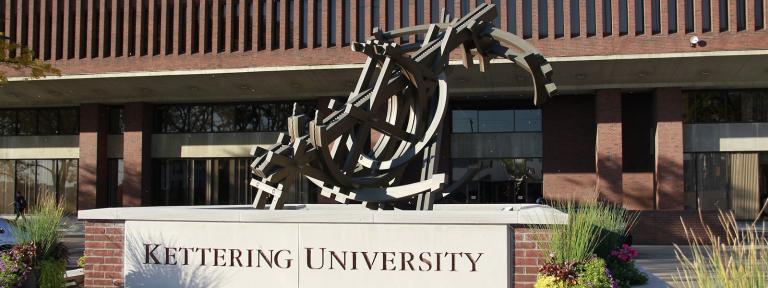
The state of Baden-Wuerttemberg (BW) in southwest Germany is the backbone of the higher education landscape in Germany and is the major manufacturing region for Europe. By population, it is only slightly larger than Michigan(10.5 million people).
BW has eight universities dedicated to cooperative education, utilizing 8,400 companies to place 19,000 co-op students, said Dr. Peter Frankenberg, BW’s minister of science, research and the arts. Frankenberg addressed a large gathering at Kettering May 21 in celebration of the 15th anniversary of the BW-Kettering study-abroad exchange program.
The German education minister along with Professor Gerhard Walliser, coordinator in Germany of the BW-Kettering exchange program; and Ines Busch, BW’s head of the department of International and European Union Affairs, were part of the special delegation that traveled to Kettering to mark the anniversary and discuss future growth of the program. Guests from Reutlingen included Reutlingen University President Peter Niess, Professor Baldur Viet, director of the International Office and Professor Bernd Thomas from Mechanical Engineering.
“Kettering has a great history and tradition in exchanging students with Germany,” said Kettering Provost Michael Harris. “We are delighted to have such a significant delegation from Baden-Wuerttemberg with us to help celebrate the many who have sustained this relationship through the years.”
Frankenberg shared a brief history of education in his state, saying that the first university began in Heidelbergin 1386. Today, there are almost 60 institutions focused on preparing students in a multitude of fields. “”Energy research is a mega topic in Germany,” he explained. “And renewable materials have a new importance and focus. We spend a lot of time studying the overlap of the sciences, especially physics, biology and chemistry,” he continued.
“We have to overcome the barriers between the disciplines, however,” he said. “We need lighter materials and new sources of energy and must create more cooperation to meet our urgent energy challenges.”
Frankenberg said Germany’s universities seek better technology transfer, mobility, flexibility and quality assurance, as well as new ways to educate students. “We’ll be focusing on cycled study, employability and modularization to deal with the internationalization we face.”
Concluding, he said, “we sincerely appreciate the exchange program we have with Kettering University and are pleased to invite students into academic environments that are safe and interesting. We are very proud of this study-abroad program and have grown very fond of it,” he added.
The BW-Kettering study-abroad program typically exchanges 150 students during an academic year. Since 1995, 1,584 students have participated (745Kettering students and 839 BW students). Kettering students enroll in one of five BW universities and are able to bring back 16 academic credits from their exchange studies. Most students use the study trip to explore Europe while becoming exposed to European standards of academic excellence and scientific research. A culture class is a key part of their educational experience.
Written by Patricia Mroczek
810.762.9533
pmroczek@kettering.edu